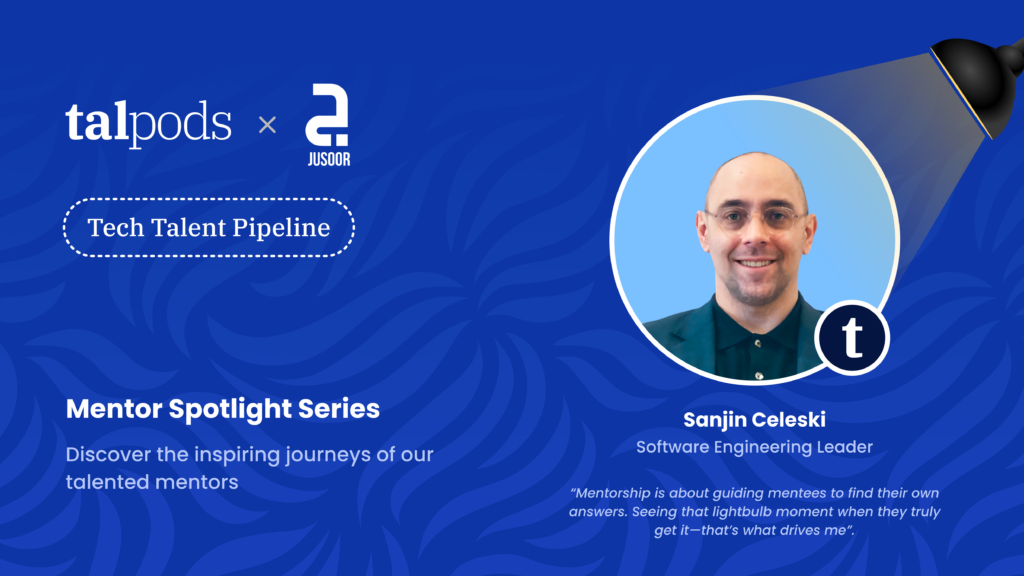In our Mentor Spotlight Series, we shine a light on the extraordinary mentors who are shaping the future of tech talent within the TalPods-Jusoor Tech Talent Pipeline.

Welcome to the first edition of our Mentor Spotlight Series, where we shine a light on the extraordinary mentors who are shaping the future of tech talent within the TalPods-Jusoor Tech Talent Pipeline. Kicking off this series is Sanjin Celeski—a tech leader at Paymob with a passion for lifelong learning and empowering others. In this candid conversation, Sanjin reflects on his journey, the power of mentorship, and his vision for the tech landscape in the MENA region.
1. What was your first spark of interest in technology? Did you ever imagine it would lead you to where you are today?
Sanjin: From as early as I can remember, I was fascinated by how things worked. Even in primary school, I was the kid who’d take apart gadgets just to see their inner workings. But it wasn’t until high school that I really dove into software. A friend and I created a computer game together, and that was my first taste of how powerful tech could be.
My official tech journey started back in Croatia during college, working with a small team on digital projects. One of my proudest moments was building Cue Songs, a platform for Peter Gabriel, which secured half a million GBP in funding. That success was a game-changer, giving me the confidence to move into leadership roles when I relocated to the UAE. Today, I blend my technical background with strategic oversight, which has been incredibly fulfilling.
2. What’s a memorable experience that inspired you to become a mentor?
Sanjin: About ten years ago, I was interviewing for a remote developer position. Instead of just assessing my skills, the interviewer took the time to teach me everything I didn’t know during that conversation. It was a game-changing experience.
I had never had a mentor early in my career, so that moment made me realize how valuable mentorship can be. I decided then and there that I wanted to be that kind of supportive figure for others. Over the years, I’ve developed a mentorship style focused on the Socratic method. It’s all about guiding mentees to think critically and find their own answers. The most rewarding part? Seeing that lightbulb moment when they truly get it.
3. What drew you to the TalPods-Jusoor Tech Talent Pipeline, and how has the experience been so far?
Sanjin: I was introduced to TalPods by Ameer Jawad, the CEO, and was immediately intrigued by the initiative. The program’s sponsorship model really stood out—it ensures that neither mentees nor clients bear any financial burden, making mentorship accessible to all. That’s what I love about this initiative; it’s truly focused on impact and growth.
The TalPods model is unlike anything I’ve seen. It’s not just about placing talent but ensuring they thrive without any financial burden on either the mentees or the clients. That focus on creating impact is truly unique. Being part of it has been incredibly fulfilling.
4. Can you share a particularly rewarding experience with one of your mentees?
Sanjin: One of the most gratifying moments recently was receiving a heartfelt message from a former mentee on Boss’s Day. It was completely out of the blue, thanking me for the guidance that helped them succeed in their role.
But beyond the thank-yous, the real reward is watching a mentee thrive. One of the things I emphasize is the importance of teaching others—whether it’s through code reviews, team presentations, or even informal knowledge-sharing. When mentees start teaching their peers, that’s when I know they’ve truly internalized their learning.
5. How do you see the tech scene evolving in the region, and what role does mentorship play in this growth?
Sanjin: The MENA region’s tech landscape is maturing rapidly, especially in the startup ecosystem. But there’s still a gap when it comes to experience compared to more established markets like the U.S or Europe. That’s where mentorship becomes vital.
Bringing in seasoned professionals who can share best practices and insights from established markets can significantly accelerate the region’s growth. It’s not just about closing the knowledge gap—it’s about creating a sustainable, competitive tech ecosystem that can thrive on a global scale.
6. What do you believe are the critical skills that tech professionals need today? How do you help your mentees develop these?
Sanjin: The ability to teach is often overlooked but is one of the most critical skills in tech. Teaching others not only reinforces your own understanding but also sharpens your communication skills. It’s essential for collaboration in any team environment.
I encourage my mentees to share their knowledge—whether through formal presentations, code reviews, or simply discussing their approach with peers. This habit of explaining their thought process helps them solidify their understanding and builds a mindset centered on continuous learning.
7. For those just starting out in tech, what’s one piece of advice you’d give to set them up for success?
Sanjin: Master the fundamentals. In today’s world, where AI tools can generate solutions in minutes, it’s tempting to take shortcuts. But without a solid understanding of the underlying principles, those solutions can be shallow.
I always tell newcomers to deeply engage with the code—read it, question it, and truly understand it. That way, when you do use AI tools, you can critically evaluate their outputs and leverage them effectively. It’s all about combining innovation with a strong foundation.
The TalPods-Jusoor Tech Talent Pipeline is an intensive tech apprenticeship program designed to equip Syrian engineers with the skills and experience necessary to excel in the tech industry. Learn more about the program.







Leave a Reply